IFRI-PARI Joint Workshop
GSDM 54th Platform Seminar
Current Challenges in Security and Energy: Perspectives from Europe and Asia
Report
| [Date] | Monday, March 23, 9:00-13:00 |
|---|---|
| [Venue] | Seminar Room, Ito International Research Center, Hongo Campus of the University of Tokyo |
| [Language] | English |
| [Hosted by] | Institut français des relations internationals (IFRI) / Policy Alternatives Research Institute (PARI) |
| [Co-hosted by] | Global Leader Program for Social Design and Management (GSDM), the University of Tokyo |
On Monday 23rd March 2015 the first joint workshop between the French Institute of International Relations (henceforth: IFRI), and UTokyo Policy Alternatives Research Institute (PARI), took place at the Ito International Research Center of the University of Tokyo (Hongo Campus).
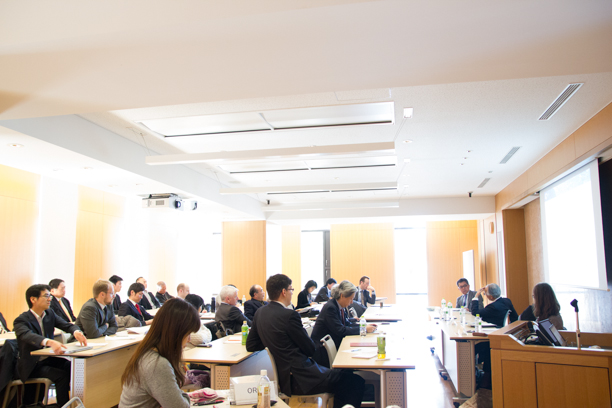
The workshop was dedicated to the nexus of energy and security policies, with a discussion of both themes from a European and an Asian perspective. PARI was delighted to welcome a delegation of three distinguished scholars from IFRI, namely Dr. Françoise Nicholas, Director of the Centre for Asian Studies of IFRI, Dr. Thomas Gomart, Vice President for Strategic Development, and Dr. Carole Mathieu, Research Fellow. PARI was represented by the institute's Director Professor Ichiro Sakata, by Professor Hideaki Shiroyama, Dean of the Graduate School of Public Policy (GraSPP) and former PARI Director, by Professor Nobuo Tanaka, former Executive Director of the International Energy Agency (IEA), Professor Kiichi Fujiwara, Director of the Security Studies Unit, Professor Hisashi Yoshikawa, and Dr. Roberto Orsi.
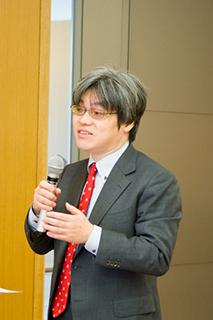
Prof. Ichiro Sakata
(Director, PARI)
Professor Sakata opened the event by welcoming IFRI's delegation. In his opening statement, he remarked the centrality for PARI of the double effort in both internationalisation, to be achieved by establishing, among others, solid partnerships with leading institutions overseas, and interdisciplinary research, a key requirement for any project which intends to capture the complexity of the interaction between society, technology, and economic dynamics. This is particularly important in the present context of rising "global issues", namely problems which cannot be tackled by any country, however powerful, acting alone, but require intense international cooperation, joint research and information exchange. Professor Sakata then illustrated several examples of ongoing research projects at PARI, with particular emphasis on the one concerning the electrification of rural areas of Myanmar. He concluded by wishing success to the workshop participants and the by envisaging further forms of cooperation between the two institutes.
Session 1

Prof. Hisashi Yoshikawa
(PARI)
Professor Yoshikawa was the moderator of the first session, programmatically entitled “Currents Challenges in Security and Energy: Perspectives from Europe and Asia”. Speakers in this session were Professor Nobuo Tanaka and Dr. Thomas Gomart, alongside with Dr. Ingrid Barnsley, Head of the International Partnerships and Initiatives Division at the IEA, and Dr. Carole Mathieu. Professor Yoshikawa invited the speakers to concentrate on two points, namely 1) drawing, as much as possible, on comparisons between the energy security architecture of Europe and Asia, paying particular attention to the role of Russia, and 2) trying to single out what Asia may possibly learn from the European experience.
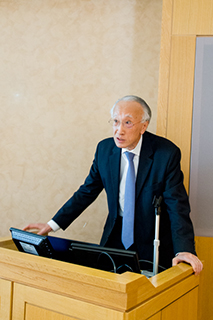
Prof. Nobuo Tanaka
(Graduate School of Public Policy)
Presentation Slides
Professor Tanaka started his intervention by articulating the fundamental questions of future global energy security, which appears quite stormy. Many uncertainties affect vital actors, such as Middle Eastern suppliers and Russia, together with climate change. Will the change be led and controlled by policy? Professor Tanaka sketched a picture of the world's energy supply system, stating that we have now entered a new era in the oil industry. Historically, there is nothing abnormal in (even ample) fluctuations in the price of oil, but the recent lows are a product of the Saudi policy of testing US shale oil resilience, more than a simply supply and demand dynamics. In contrast to past “bear market” conditions, the future of oil markets will continue to be affected by the rapidly growing demand from emerging economies, which was already a driving factor in the past decade. The IEA expects a rapid growth of demand from today to 2040, and most of it will have to be covered by additional production in the Middle East, particularly in Iraq. Considering the difficult political situation of that area, it is clear that energy security will remain a very prominent topic of political concern. China is diversifying its energy supply system by heavily investing in a large pipeline system in the Euroasian landmass, while being still very dependent on sea-lanes connecting it to the Gulf region. Professor Tanaka has expressed the remark that Asian nations should work together to ensure the security of maritime traffic. China and India should also join the IEA as they have become large energy importers over the last decades. Natural gas is likely to become a more important energy source, with Australia, Canada, Eastern Africa, and of course Russia as the largest suppliers.
Professor Tanaka argued for a re-integration of Russia in the international community, hoping for a change in the course of US foreign policy vis--vis Moscow, the latter being too important for the future of Middle Eastern, European, and Asian affairs.
There are also numerous challenges coming from the reduction of CO2 emissions, which may be enhanced by, on the one hand a more widespread use of natural gas, on the other by the adoption (particularly in Asia) of better technologies for the use of coal, which will continue to have a prominent role. To this, it has to be added that the most industrialised nations face the prospect of retiring and replacing a very large number of power plants (both thermoelectric and nuclear) in the next few decades. Renewables will continue to grow but will remain a relatively small part of global supply.
Finally, Professor Tanaka has highlighted existing projects for the Asian energy network's integration, which remains to this point rather limited (for instance, even within Japan the Eastern and Western halves of the country have separated and incompatible electricity grids), with many future possibilities remaining open to exploration, especially on the model of the European Union. Concerning Japan, he expressed the view that nuclear will return as a key component of the Japanese energy mix, stressing the importance of moving towards new technologies.
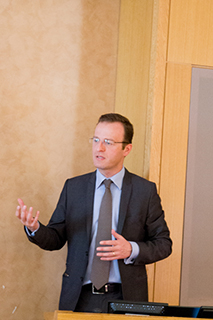
Dr. Thomas Gomart
(IFRI)
Dr. Gomart delivered a speech for the first session focused on the energy-related implications of the current political and security situation in Russia, and of the ongoing conflict in the Ukraine, whose importance cannot be underestimated. Russia is the EU's top energy supplier, having a prominent role in oil, gas, and coal, which remain by far the most important energy commodities. On the other hand, it must be considered that energy security has always had a large impact on European energy strategies. Currently, we face a rapidly changing environment conditioned by three factors: the drop in the international price of crude oil, the renegotiation of the gas supplies contracts between Europe and Russia, and the political-military situation in the Ukraine. A number of uncertainties are likely to have an influence on the energy scenarios of Europe and Russia, namely: the strong connection between Russia's energy policy and foreign/defence policy; the tensions between Gazprom and Rosneft; the unclear, possibly changing future role of Russia as Europe's supplier.
Dr. Gomart indicated that Russia's foreign policy is characterised by three pillars: its energy policies, its security policy, and the quest for international prestige. Russia is the only country in the world, together with the US and China, which can still have a grand strategy. A basic mechanism of Moscow's strategy, particularly after 2000, has been the direct financing of military reconstruction by channeling in it energy revenues. It is also important to understand that when someone refers to “energy security”, this phrase may be interpreted in different ways by actors occupying different positions. In Europe, it means a reliable flow of commodities, but for Russia, this implies the problem of transit countries, their stability and reliability. The Ukraine is a fundamental part of the Russian geopolitical strategy and its security, far more important for Moscow than for the Europe or the US. Within Russia itself however, there are a number of tensions among key political and economic players, with President Putin trying to mediate between the different factions. Gazprom is rising even more as a driving factor in the country's security policies, and as a powerful player in the decision to pivot towards Asia. In particular, the decision to cancel the South Stream project highlights the new importance given to Turkey.
Russia's security strategy, even if it is often portrayed as aggressive, is in reality one inspired by principles of territorial defence. The main threats perceived by Moscow are the insurgency in the Caucasus and the eastward NATO expansion. After 9/11, there has been a partial convergence between Russia and the US on the global fight against terrorism, but deep political divergences persist.
President Putin, since his sudden ascent to power in 2000, has worked at the construction of a complex balance between different institutions. Himself coming from the intelligence (FSB), he needs to continuously mediate between the Kremlin, the armed forces, and the security services. In the past fifteen years, he has presided over the reconstruction of the military, in which a large share of the energy revenues has been spent, particularly in strengthening the special forces, the navy, and cyber-war capabilities. Dr. Gomart has argued that this entire strategy has been premised on the Russian quest for international prestige, and also by the personal ambitions of President Putin to be considered among the greatest figures of Russia's history, alongside Peter I and Catherine the Great.
This whole set of policies is however currently undergoing a number of severe challenges, starting from the economic recession which is currently taking place, not only the result of the plunge in oil prices and international sanctions, but especially of the failure to significantly diversify the economy away from energy commodity exports.
On the international political front, Russia has managed to avoid international isolation, as many countries have not adhered to the Western reading of the Ukrainian crisis, notably India, Turkey, Israel, Brazil, and China. Particularly in relation to a hypothetical Moscow-Beijing rapproachement, it is uncertain to what extent this is actually taking place, and even more importantly, what would be the consequence of Russia becoming a junior partner of China. Dr. Gomart concluded by saying that this would be an unfortunate scenario for the Europeans.
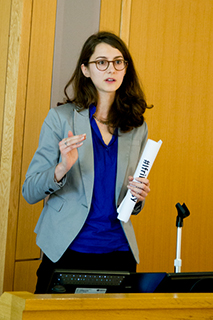
Dr. Carole Mathieu
(IFRI)
Presentation Slides
Ms. Mathieu illustrated in her presentation the structure, evolution and possible future challenges of Europe's energy security architecture. She started her presentation by providing a series of quantitative data, showing the high degree of dependence of the EU in its entirety in relation to energy commodities imports, particularly of fossil fuels (coal, oil, and gas). This trend is likely to continue, and most forecasts still see a prominent role for fossil fuels in 2040. However, it must be noticed that dependency from imports greatly varies from country to country, and also the degree of source diversification.
Coming to the question of energy security, it is clear that the primary concerns have been rising from the gas sector, as a combination of the relatively fixed nature of supply infrastructures and routes (pipeline networks) and the political instability of suppliers and/or countries of transit. There is no easy replacement for Russian gas, nor easy solutions (both at practical and political levels) for more secure transit routes. Within this scenario, it has been proposed that the EU moves towards an authentic “energy union”, with a more political approach and a better articulation between the internal and external dimensions of energy policy. The aim is to create a secure and resilient EU energy sector, while transitioning towards a low carbon economy. Ms. Mathieu mentioned the “five mutually reinforcing and interrelated dimensions” of the prospected energy union, namely: energy security, a fully integrated European energy market, R&D competitiveness, energy efficiency, and low carbon emissions. At more concrete level, this strategy calls for the creation of shared infrastructure and networks, the coordination of national responses to supply crises, the establishment of strategic partnerships with suppliers, as well as the search for new sources of energy imports.
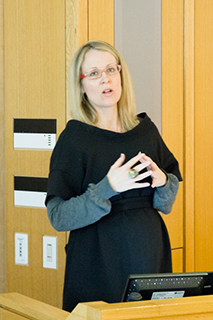
Dr. Ingrid Barnsley
(IEA)
Presentation Slides
Dr. Barnsley focused in her presentation on the energy security questions of Southeastern Asia. “Energy security” in that part of the world has a very different meaning from the one in more economically developed regions. Indeed, in many South East Asian nations the main problems remains that of electrification, particularly in rural communities, and ensuring access, and adequate supply of energy use. The region is however rapidly changing, and future projections of key demographic and economic drivers easily reveal how that part of the world is becoming a major centre for the global energy industry. By 2035, the population is expected to expand by one third (from today's 600 million people), and GDP will likely triple. The demand of energy will expand greatly. Because only a part of such expansion can be covered by domestically sourced energy commodities, it is expected that imports will continue to rise, generating a situation of high energy dependence, especially from sources located in the Middle East. South East Asia, together with China and India, will contribute to the global shift of the global energy system to Asia. Numerous challenges lie ahead, and ASEAN leadership is responding with a score of initiatives which go in the direction of energy integration both at infrastructural level (electricity grid, pipelines), and policy coordination.
Session 2
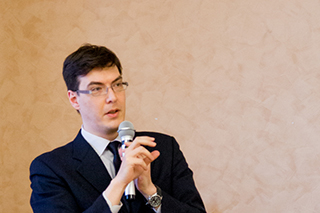
Dr. Roberto Orsi
(PARI)
Dr. Orsi was the moderator of the second session, entitled “Security Challenges in Europe and Asia”. He introduced the topic by recalling the connections between the question of energy security and broader conceptions of national security, which have become significantly more apparent, and pressing, particularly with the worsening military crises in the Middle Eastern area, and in the Ukraine. He successively invited the three panellists to speak. Speakers in this session were Professor Kiichi Fujiwara, Dr. Thomas Gomart, and Dr. Yee Kung Heng, Assistant professor at the Lee Kuan Yew School of Public Policy (National University of Singapore).
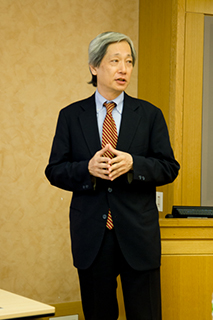
Prof. Kiichi Fujiwara
(Vice Director, PARI)
Professor Fujiwara opened his talk by identifying the ongoing trend of growing global disorder which derives from the crumbling of the post-Cold War settlement, and the underlying politico-economic architecture. In the early 1990s and for about a decade, there was a strong optimism about the future of the world. In that visions, democracies would have led humanity towards a new era of economic prosperity and democratisation. Emerging economies would have provided growth, while diplomacy and international political dynamics would have been conducted within the framework of liberal international institutions. All this is gone. Professor Fujiwara stated that the proliferation of failed and failing states is the first security concern which has to be faced at this point. A second important variable has been the shifting US policy in the Middle East. For long time during the Cold War, Egypt was regarded as an enemy, but since the 1979 revolution Iran became the primary target of US policies in the area. However, in the broader context of a Shi'a-Sunni confrontation, the US is now compelled again to activate itself against the radicalism which grips the Sunni world, whose more evident manifestations is the Islamic State. There is a burning house, and the fire is expanding in the region. The Western world have demonstrated that it can fight military organisations, but it has been unable to provide for the effective reconstruction of functioning states.
Besides the breakdown of the international political order, a power transition is currently taking place. A certain uncontested US global hegemony is virtually gone. This is however due mostly to a decline in the American will to lead and take action, rather than to a lack of resources. On Russia, Professor Fujiwara has remarked that the days of the docile Russia of the Yeltsin's era are gone for good. Russia is unlikely to follow any directive coming from Europe, and even in the currently difficult economic and diplomatic situation, it is highly unlikely that Moscow will change the course of its policies.
Within this framework, a number of ideas are also ageing. One is the commercial peace theory, whereby economic interdependence leads to a strengthening of peace and to the easing of international tensions. A second one is the idea that “democracy is the answer”, namely that democracy automatically enhances domestic and international political order. This appears to be overly simplistic, as the capability of a regime to govern may be more important than its openness.
After addressing the complex questions still unanswered in Myanmar's political transition, Professor Fujiwara has addresses the issue of China's foreign policy. This appears to be considerably less aggressive than in the recent past. President Xi seems to be emulating to a certain extent the reformist effort of Deng Xiaoping. This is good news for the stability of East Asia, as China has now adopted a more conservative and restrained foreign policy approach.
Dr. Gomart has then delivered his second talk, this time focused on Russia's security policy. He started by providing a list of what have been so far considered the chief risks and threats in twenty-first century politics, namely failed states, nuclear proliferation, and terrorism. To that, Dr. Gomart argued, one should now add the return of traditional power politics. In the past decade, four out of five UN Security Council members have destroyed the sovereignty of a UN member state, China being the only one which refrained from such actions, and which may get rewarded by its relative restraint.
In Europe, the geopolitical order envisaged in the Charter of Paris (1991) is rapidly coming to an end. In a more general perspective, it appears that Europe is losing its comparative advantage vis--vis numerous areas of the world, namely its security and absence of large-scale military threats. The current situation can be described as very serious; the EU/Russia split has consequences which possess a global dimension. According to Dr. Gomart, the actual centre of the international geopolitical crisis in the Middle East. The ramifications of the conflicts taking place in that area connect all other theatres, namely Chechnya, and the Ukrainian front. In this context, any comparison with the Cold War only captures a part of the current predicament. If one has to look for historical precedents and comparisons, Dr. Gomart argued, it would be better to look firstly at the millennia-old split between Rome and Byzantium. The Russian Orthodox Church is in this sense clearly constructing such kind of narratives of the crisis. Secondly, there are parallels between the current crisis and the Crimean War in 1854-56, as Russia sees itself as the protector of Christians in the Middle East. This also has an important role in Russia's involvement in Syria. Although dating back to the 1950s, Russia is in this moment not specifically interested in a defence of the Assad regime, but in the construction of a viable political order in the country. A third element of the Russian ideology is the concept of державность (derzhavnost'), meaning that Russia sees itself as a great power, according to an idea articulated by the Yeltsin-era Minister of Foreign Affair Evgeny Primakov, namely that the twenty-first century will be dominated by the triad: US, China, and Russia. Moscow refuses both shariah and Western-style democracy as political systems, and fights therefore on two fronts.
Global consequences of the Russian-EU rift have serious implication for a long list of issues, from non-proliferation to the return of spheres of influences, to the security of the EU itself, especially when Russia is testing the coherence and credibility of NATO. Regarding the Russia-China rapprochement, several theories and views exist, but it seems that the two countries, while their cooperation has increased overtime, are unlikely to build a strategic alliance, as each is concern with a different strategic vision. Finally, Dr. Gomart concluded that Russia has changed from a risk factor to a threat for the European Union, which now finds itself dealing with multiples security crises at the same time.
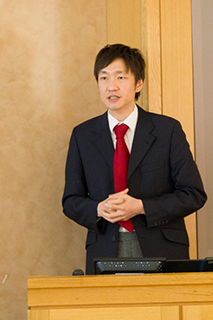
Dr. Yee-Kuang Heng
(Graduate School of Public Policy)
Presentation Slides
Dr. Heng focused his presentation on the changing security environment of South East Asia, characterised by the growing presence of China, as a direct consequence of Beijing's large scale military build-up, its bouts of aggressiveness after 2010, and the expansion of Chinese economic interests in the area between the South China Sea and the Indian Ocean (energy sea lanes in particular). ASEAN countries have displayed so far a variety of approaches, depending on the degree of intensity in their economic and security ties with China, and on the presence of territorial/maritime disputes. Overall, it can be said that ASEAN nations are trying to preserve a degree of equidistance between the two great powers capable of polarising the region (US and China), and they have been working on the establishment of diplomatic frameworks for defusing possible crises. The US has been defined as “the least disliked” great power in the region, whose involvement continues, and has been strengthening to a certain extend with Obama's “pivot to Asia” strategy. Alongside traditions security issues, numerous unconventional threats have emerged in recent years, from environmental challenges (climate change impact, transboundary haze) to terrorism.
The ensuing discussion focused predominantly on the possible evolution of global affairs, which may see a return of significant military investment by EU nations, even if the predominant political culture seems hostile to re-militarisation; secondly, the possible US re-engagement with global affairs appears to be heavily conditioned by the dynamics of domestic politics, but it seems probable that, if the next administration will be an expression of the GOP, it will act in a comparatively more aggressive way then the current one.
Concluding remarks
In the last part of the workshop, Professor Hideaki Shiroyama from PARI side and Dr. Françoise Nicolas from the IFRI side, have delivered their concluding remarks.
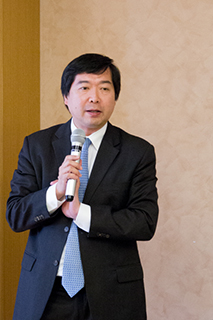
Prof. Hideaki Shiroyama
(Graduate School of Public Policy)
Professor Shiroyama praised the good exchange of views which took place during the workshop on a variety of topics, which are close to the core of many research projects at PARI, particularly the energy-security nexus. In this respect, Asia and Europe find themselves in almost opposite situations, with a high level of infrastructural integration in the latter, and very limited integration in the former. The discussion has revealed the numerous advantages of integrations, but the lack thereof may also signify a higher degree of flexibility and adaptability to a changing environment. Finally, he remarked the importance for PARI to work in the direction of establishing close cooperation links with overseas research institutions, IFRI being a privileged choice given its prestige and the high quality of its achievements, and hoping for a lasting and mutually enriching collaboration.
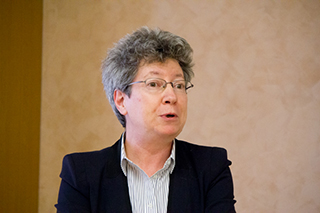
Dr. Françoise Nicolas
(IFRI)
Dr. Nicolas praised the wide convergence of research interests among the two institutions, which allows the establishment of a good working relation. She noticed how this workshop has underscored themes which are often neglected, such as the role of historical narratives and perspectives in international politics. Dr. Nicolas expressed the view that further collaboration may also focus on the role of China, and on the future of Myanmar, a country which has captured her research interest. Finally, she expressed the wish to continue the profitable discussion in a next joint event soon.


